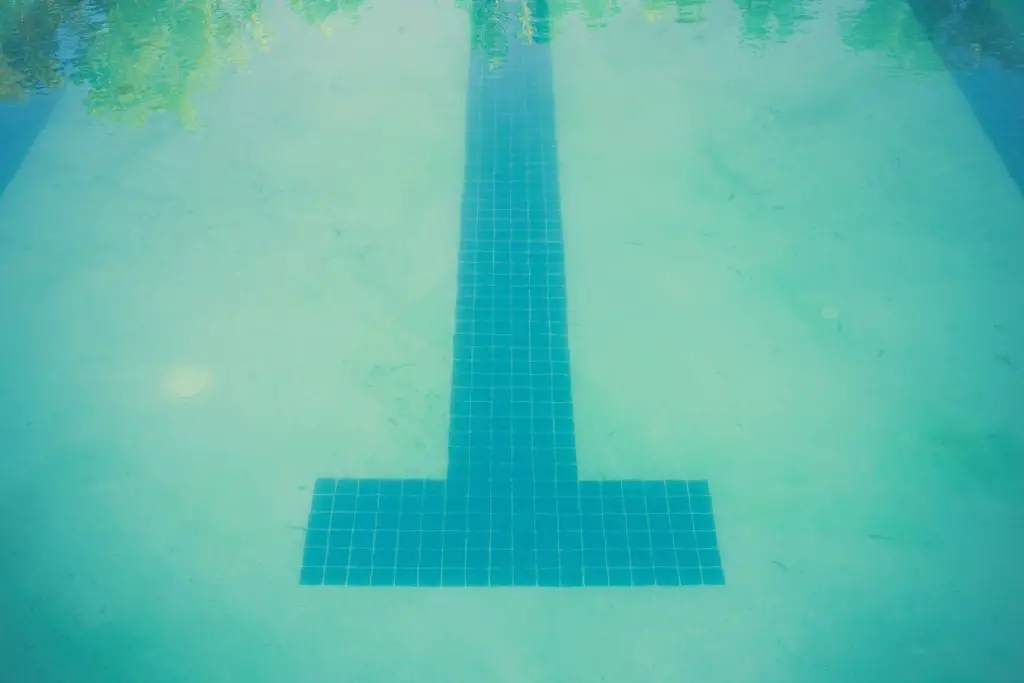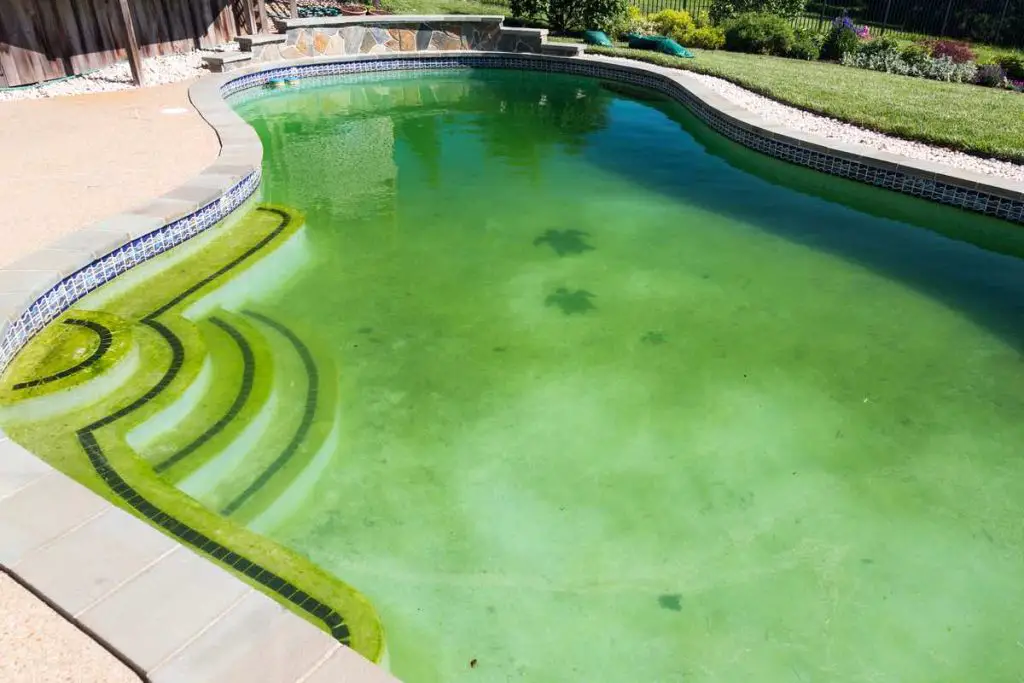Sometimes you don’t have the energy to clean your pool before you get into it. While this isn’t an issue if only a few leaves are on the water’s surface, it can pose a problem when major maintenance is needed, such as when your pool is cloudy. But why should you avoid swimming in a cloudy pool – and what happens if you choose to swim in it regardless?
Cloudy pools often indicate that the pool is full of bacteria and other germs that can cause stomach problems, including giardiasis, E. Coli infection, and cryptosporidiosis. There is also a risk to swimmers as visibility will be poor in cloudy pools, increasing the drowning risk.
You’re in the right place if you want to learn more about the risks of swimming in a cloudy pool. In this article, I’ll explain why you shouldn’t swim in a cloudy pool, why your pool may be murky, and how to clean a murky pool.

Why Swimming in a Cloudy Pool Is Inadvisable
There are several reasons why swimming in a cloudy pool is inadvisable. These include:
Health Concerns
As mentioned above, one of the consequences of a cloudy pool is an increased bacteria presence. These bacteria can cause a variety of gastrointestinal illnesses like giardiasis and cryptosporidiosis. They also increase the chances of you developing a urinary tract infection.
Many people think swimming in a cloudy pool is safe if they can smell chlorine because they think the chlorine will kill any harmful bacteria. However, the smell of chlorine in a pool results from chemical compounds known as chloramines.
Chloramines form when the chlorine added to a pool comes into contact with contaminants in the pool. This can include cosmetics and perspiration, but it also includes bacteria. Therefore, if your pool smells particularly strongly of chlorine, it’s a sign that it is full of contaminants and needs to be cleaned.
Safety Risks
Aside from health risks, swimming in a cloudy pool is also a health issue. For one, murky pool water makes it difficult to see under the surface, so you may find it difficult to see swimmers struggling under the water. This increases the risk of drowning, especially when the pool is used by poor swimmers or young children.
Additionally, cloudy water can make it hard to judge how deep a pool is if you aren’t familiar with it. This can cause injury if a person jumps into a pool that is too shallow and increases the risk of drowning if they think they’re jumping in a shallower section and instead leap into an area that is deeper than they can deal with.
Personal Preference
Even without considering the health and safety risks of cloudy pools, the fact is that swimming in such pool water is simply disgusting. Even if there are no harmful bacteria, the pool water’s murky nature indicates that it is dirty due to common pool contaminants, such as perspiration, sunscreen, and even urine. Most people simply find cloudy pools too gross to swim in.
Reasons for Cloudy Pool Water
Some of the reasons for cloudy pool water include:
- Rainwater that causes chemical and mineral run-off to get into your pool. This is more common when you experience a major storm rather than regular rainfall. Rainfall can also result in insects and bird droppings being deposited in your pool water.
- Environmental debris like pollen and dust.
- Excess amounts of ammonia
- Algae bloom in your pool. While late-stage algae bloom makes your pool water look green and opaque, the early stages cause cloudy pool water.
- Poor filtration. Inadequate filtration is perhaps the most common cause of a cloudy pool, and a damaged or faulty filtration system means the pool water does not filter out and becomes dirty and unclean. Some causes of a damaged filtration system include clogged filters, scaling on the filter, or a damaged pump.
- Chemical imbalance. Some forms of chemical imbalance include imbalanced chlorine levels, too high calcium hardness, and too high total alkalinity levels. Other concerns include a pH level that is too high or too low (the level should be between 7 and 7.6) and imbalanced pool stabilizer levels.
How To Clean a Cloudy Pool
Before you can clean a cloudy pool, you must first determine what the problem is:
Mechanical Problems
If there is a mechanical cause behind cloudy pool water (such as a damaged filtration system), the solution is relatively simple – fix the mechanical problem.
To reduce the risk of this happening again, you should ensure you conduct regular maintenance of your pool equipment, especially the filtration system. You should also ensure your filtration system runs enough to keep your water clean – 24/7 if you use the pool frequently and 8-10 if you use it less often.
pH Imbalance
If your pH levels are imbalanced, you first need to determine if the levels are too high or too low. If they are too low, use a pH increaser to fix the issue. If they are too high, use a pH reducer to reduce the levels. Standard reducers include muriatic acid, while soda ash is a common pH increaser.
Muriatic acid can also be used to balance the total alkalinity in your pool if your pool is too alkaline. The alkalinity should be 80-120 ppm, and if it is too high, muriatic acid can help bring it down. However, if it is too low, you can fix the issue by adding baking soda to your pool.
Dirty Pool
If your pool is dirty – whether it’s due to chemical run-off or debris such as leaves and pollen – you will need to clean it. There are several ways to remove existing particles from your pool, including:
- Using nets for larger particles.
- Using a pool flocculent or pool clarifier for smaller particles and then vacuuming them.
- Scrubbing early-stage algae with a vacuum and leaf net, then shocking the pool. Use chemicals to prevent further algae growth.
- Covering the pool and/or using a chlorine stabilizer if your chlorine levels are running low.
If you need to remove particles and water from your pool with a vacuum, you can also drain part of the water and refill it with your garden hose. You should not drain your pool completely unless you have no other choice.
If your pool continues to look cloudy or you don’t have time to diagnose and solve the issue, you can also consider contacting a professional pool cleaner. They will be able to get your pool water looking clear again, and they can also let you know if you have to drain and refill your pool.

Conclusion
While swimming in a cloudy pool is technically possible, it should be avoided as far as possible. Swimming in an unclean pool carries health and safety risks and is also generally gross. If your pool is cloudy, diagnosing the issue and fixing the murky water as soon as possible is essential.
Sources
- The Pool Butler: When to Drain a Swimming Pool | Why Not to Drain a Pool
- Swim University: How to Clear Cloudy Pool Water in 48 Hours or Less
- Arm and Hammer: Maintain Your Pool with Baking Soda
- The Crystal Clear Pool: Alkalinity in Pools – Why’s it So Important and How to Control
- Better Health Channel: Swimming pools – water quality
- Eco Outdoor: What Is Cloudy Pool Water And How Do I Fix It?
- Den Garden: 7 Causes of Cloudy Swimming Pool Water and How to Clear It
- ChemTreat: Flocculants and Coagulants
- ChemicalSafetyFacts.org: Chloramines: Understanding “Pool Smell”
- Leslie’s Pool: Understanding the Dangers of Cloudy Pool Water
- Pool Works: Cloudy Pool Water – A Danger To Swimmers
- My Perfect Pool: Milky Pool Water: Is it OK to Swim and How to Clear It
